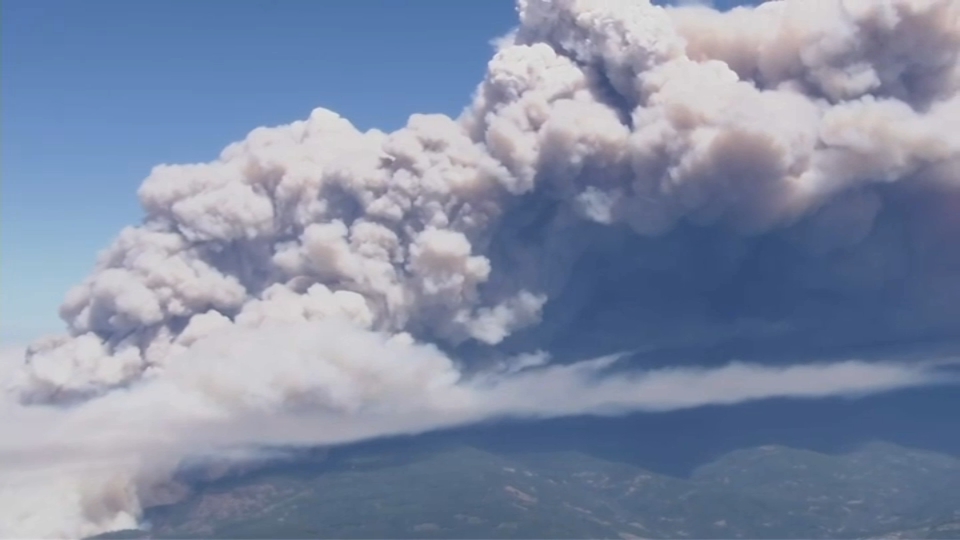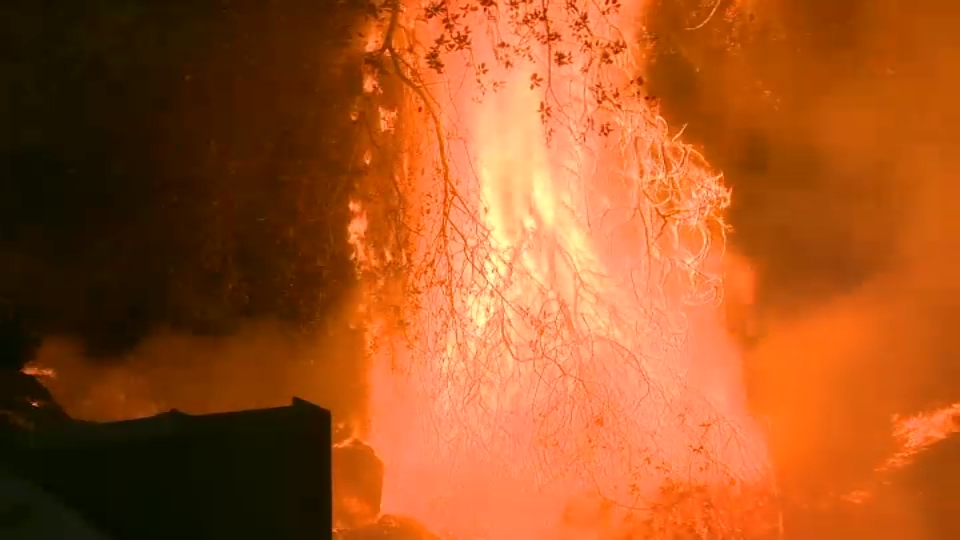A Northern California wildfire continued to roar through forest land and small communities across two counties Friday. Sergio Quintana reports.
Thousands of firefighters battling a wildfire in northern California received some help from the weather Saturday, just hours after the blaze exploded in size, scorching an area greater than the size of Los Angeles. The blaze was one of several tearing through the western United States and Canada, fueled by wind and heat.
Cooler temperatures and an increase in humidity on Saturday could help slow the Park Fire, the largest blaze so far this year in California. The blaze’s intensity and dramatic spread led fire officials to make unwelcome comparisons to the monstrous Camp Fire. That fire burned out of control in nearby Paradise in 2018, killing 85 people and torching 11,000 homes.
As of Saturday afternoon, the fire has burned about 348,370 acres and is 0% contained.
And Paradise again was near the danger zone. The entire town was under an evacuation warning Saturday, one of several communities in Butte County. Evacuation orders were also issued in Plumas, Tehama and Shasta counties. An evacuation warning calls for people to prepare to evacuate and await instructions. An evacuation order means to leave immediately.
Temperatures are expected to be cooler than average through the middle of next week, but “that doesn’t mean that fires that are existing will go away,” said Marc Chenard, a meteorologist at the National Weather Service Weather Prediction Center in College Park, Maryland.
The blaze has scorched 540 square miles (1,409 square kilometers) as of Saturday with no containment. Los Angeles covers roughly 503 square miles (1,320 square kilometers). The blaze was moving north and east after igniting Wednesday, when authorities said a man pushed a burning car into a gully in Chico and then calmly blended in with others fleeing the scene.
Ronnie Dean Stout, 42, of Chico, was arrested early Thursday in connection with the blaze and held without bail pending a Monday arraignment, officials said. There was no reply to an email to the district attorney asking whether the suspect had legal representation or someone who could comment on his behalf.
Cal Fire incident commander Billy See said at a briefing on Saturday that the blaze had been advancing 8 square miles (21 square kilometers) per hour since its inception. But there was cautious optimism as weather conditions slowed the fire’s advance in some areas, and firefighters were able to plan and deploy additional personnel. Nearly 2,500 firefighters were battling the blaze, aided by 16 helicopters and numerous air tankers.
“Today we’ve got almost three times the personnel we had yesterday morning,” he said. “We still don’t have enough.”
Get a weekly recap of the latest San Francisco Bay Area housing news. Sign up for NBC Bay Area’s Housing Deconstructed newsletter.
He advised his crews to be aggressive, stay safe and take advantage of what likely are the best conditions they will experience in coming days.
Communities elsewhere in the U.S. West and Canada also were under siege Saturday from fast-moving flames.
More than 110 active fires covering 2,800 square miles (7,250 square kilometers) were burning in the U.S. on Friday, according to the National Interagency Fire Center. Some were caused by the weather, with climate change increasing the frequency of lightning strikes as the region endures record heat and bone-dry conditions.
In Chico, California, Carli Parker is one of hundreds who fled their homes as the Park Fire pushed close. Parker decided to leave her Forest Ranch residence with her family when the fire began burning across the street. She has previously been forced out of two homes by fire, and she said she had little hope that her residence would remain unscathed.
“I think I felt like I was in danger because the police had come to our house because we had signed up for early evacuation warnings, and they were running to their vehicle after telling us that we need to self-evacuate and they wouldn’t come back,” said Parker, a mother of five.
Amanda Brown, who lives in the same community where Stout was arrested, said she was stunned that someone would set a fire in a region where the memories of the devastation in Paradise are still fresh.
“That anyone could deliberately put our community through that again is incredibly cruel. I don’t understand it,” said the 61-year-old Brown, who’s about a mile (1.6 kilometers) from the fire but had not been ordered to evacuate.
Elsewhere, fire crews were making progress on another complex of fires burning in the Plumas National Forest near the California-Nevada line, said Forest Service spokesperson Adrienne Freeman. Traffic was backed up for miles near the border on a portion of the main highway linking Los Angeles and Las Vegas, as crews continued Saturday to battle a fire that started a day before when a truck carrying lithium-ion batteries crashed and turned onto its side.
The most damage so far has been to the Canadian Rockies’ Jasper National Park, where a fast-moving wildfire forced 25,000 people to flee and devastated the park’s namesake town, a World Heritage site. Authorities there said cool and wet weather was helping crews battle the wildfires. This comes after Parks Canada said 358 of the 1113 structures in the town of Jasper had been destroyed.
In eastern Washington state, crews late Friday stopped the forward progress of a fire near the community of Tyler that had destroyed three homes and five outbuildings, the Washington Department of Natural Resources said Saturday. The South Columbia Basin fire burned timber and grasses, and crews continued work on containment lines along the fire perimeter.
Two fires in eastern Oregon, including the Durkee and Cow Valley blazes, had burned about 660 square miles (1,709 square kilometers). Oregon Gov. Tina Kotek late Friday expressed condolences to the family of a pilot of a single-engine air tanker that had gone down in forested terrain while fighting a separate fire near the town of Seneca and the Malheur National Forest.
In Idaho, lightning strikes sparked fast-moving wildfires and the evacuation of multiple communities. The fires were burning on about 31 square miles (80 square kilometers) Friday afternoon. Juliaetta, about 27 miles (43 kilometers) southeast of the University of Idaho’s campus in Moscow, was evacuated Thursday just ahead of roaring fires, as were several other communities.
___
Rodriguez reported from San Francisco. Associated Press writers Rebecca Boone, John Antczak, Rio Yamat, David Sharp, Holly Ramer, Sarah Brumfield, Claire Rush, Terry Chea, Scott Sonner, Martha Bellisle and Amy Hanson contributed to this report.



